- Home
- A. A. Attanasio
Hunting the Ghost Dancer Page 3
Hunting the Ghost Dancer Read online
Page 3
Today, or very soon from today, there would be cress and berries, cattail sprouts and orange mushrooms. She skipped into the cave, singing, "White cranes—white cranes—spring flies overhead!"
Biklo, the family slave, squatted in the moon of morning let down by the roof-hole. He strung together hollow gourds for that morning's hike to collect water. Laconically, he smiled at Duru’s little song, his good eye sad, his blind eye bright as a shell.
He mimicked her song: "White cranes, white cranes, spring is flying overhead—and when they fly back who among us will be dead?"
"Biklo!" Duru frowned at him. "Don't tease."
"Life comes and goes like the cranes, little sister."
Duru clucked at him and ordered him back to work. Long ago, before her birth, Biklo had been captured by Grandfather Scom in combat with the Walnut Hands. Most of the men of the Walnut Hands had fought and died. The family had eaten their brains and stacked their skulls in the sea-cave where the boys became men and the women could not go.
Biklo had submitted without fighting, and Grandfather Scom had spared his life. Every summer, on the longest day, Biklo gathered field flowers and placed them on the bone-hill where Grandfather Scom now lay. And every longday without fail, the slave sang a song to the Mudman to watch over the Grandfather who had given him new life.
Duru loved Biklo for doing this and for his amusing and sometimes scary stories that whiled away long winter nights.
"White cranes—white cranes!" Duru sang, parting the grass curtain that muffled the wind from the cavemouth. The dimly lit cavern rang with her joy.
Mother and her sisters sat toasting nuts and gourd seeds with the Firewatcher, the crone who sat through the night singing breathy songs to the embers. The small children chivvied shells about, playing scuffle.
"Get your basket," Mother said, offering a toasted hazel nut. "We're going soon enough. And find your vest. There's still a chill in the air."
Duru snatched the hazel nut and bounded across the cavern to the ladder that mounted to her sleeping niche in this complex of caves and crawl-holes. Feeling mischievous with excitement, she detoured on her way up the ladder, stopping to poke her head through the moss veil of the chamber where Timov lay with the older women.
Most of the women had already risen and gone to the back vaults to freshen themselves at the stream that rilled through the rock wall there. Timov, the only uninitiated man in the Mothers' cavern, was obliged to sleep with the old women. He would still be there satisfying one or more of them.
"White cranes—white cranes!" Duru sang into the old women's chamber.
"Aw, so what?" Timov griped from the dark.
Duru could just make out his silhouette rising and falling between the stocky legs of Kwyn. Her raspy breathing sawed loudly in the dark with her pleasure. A boot thudded against the wall beside Duru's head, and she pulled away with a laugh.
"Leave Kwyn alone," Duru’s older sister, Aradia, chided her from the chamber above.
Duru hurried up the ladder and parted the curtain of ribbon grass. "White cranes, Aradia! I just saw them."
"Kwyn's bones have been aching all winter," Aradia said. She sat in the dark on her pelts stroking her soft hair with a bristle-brush. She stopped long enough for Duru to crawl into her lap. "Let Timov give her some pleasure. You know he hates doing what he must, so why do you trouble him?"
"Because he hates his work." Duru pouted. "He eats our food, takes the best pelts after the Mothers, and what does he do but complain all the time? When are the men going to take him?"
"When it pleases them."
"But there are boys two years younger already living with the men. Why can't he?"
"He'll be among them soon enough. Does he trouble you that much?"
"He puts thistle-burrs in my bed, steals my food, and never does what I tell him. He even barks at Mother."
"If not this summer then next, the men will take him. If Father were alive they'd have beckoned him by now. He has no one to stand for him."
"What about Father's brothers? They do the Father-rites for you and me."
"For the boys it's different. Father-brothers have their reasons."
"Hamr will do it."
"Hamr is of the Tortoise. Timov belongs to the Panther."
"Tell me again about the two folk." Duru squirmed in her sister's lap, intrigued by these male mysteries.
"You know all this already. Why are you acting like a baby?"
"Please, Aradia. Tell me again."
"Once, long ago," Aradia began, wearily, continuing to brush her hair, "the Tortoise men knew nothing of hunting. They were fisherfolk—and our enemies. They raided the people of the Panther for pelts and hides. We raided them for shells and fish. The women of the two tribes convinced the men to join together and share their skills as one tribe—the tribe of the Blue Shell, named for the Great Tortoise whose shell is made of two halves."
"But the two folk would never have stayed together with only the skills of the men to bind them," Duru recited.
"That's right, little sister. Men compete—women complete."
"And so the Blue Shell has two folk of men—the hunting Panther and the fishing Tortoise—and one tribe of women who bind them." Duru smiled proudly. "That's why when you take Hamr for your own, he will no longer be a Tortoise but a Panther, and then he can sponsor Timov. Hamr is brave."
Aradia sighed. "Too brave, I think, little Duru. Hamr has great dreams—and I'm afraid what happened to Father may befall him."
Father had been pierced in the thigh by a boar’s tusk three summers ago, and the children remembered the long time he had lain dying, growing weaker each day, an echo.
Duru sat up, put her hands on her sister's knees. "You are going to take Hamr for your own, aren't you, Aradia?"
"If he'll have me."
"Why wouldn't he? You're the most beautiful of the Blue Shell women." Aradia pouted at this but did not contradict her. "And besides, Hamr brags about wanting to live as a hunter. He doesn't want to fish. So he'll have to marry some Panther woman. How could he refuse you?"
"You know. We've talked about this before."
"The horse."
"Yes. He wants a horse, like the great men of old. He won't marry until he has one. And if what you say about the white cranes is true, then today is the day he will try."
Duru leaned closer, her heart high in her chest. "Today? This very day, Aradia?"
"That's the sign he's been waiting for."
"Why didn't you tell me?"
"And have you spread it around? He doesn't want a crowd watching him. And I don't want you telling Mother. Or anyone. Go up to the fields with them today. I'll join you there later and tell you what happens. Now go and get your basket, and don't forget your vest."
Duru slipped through the plaited ribbon grass and bumped into Timov. "You don't belong up here," she said. "The old women's chamber and no higher, Timov. You know that."
"Shut up, Toad. Mother let me hang my birds from the cope-beam so the mice won't spoil them. I'm getting them now." He nudged past her and made his way over the dark shelf to where several tree limbs had been lashed together and laid across the open space at the back of the cavern. There, visible in the smoky light from the fire below, several pelts hung as well as a raft of birds dangling by their legs, wings open. Timov used a tined pole to hook the raft of birds and lower it to the cavern floor.
"I see hawks," Duru said. "You've killed many."
"Six hawks, three falcons," Timov said proudly. "More than most of my friends, though the others got their share."
"Why so many?"
"Hawks and falcons, they're the only birds whose feathers are useful in the dance."
"But why kill so many? You don't need that many feathers."
"All the boys are doing it this year," Timov answered, nonchalantly. He returned the pole to its notch in the wall and pushed past her. "The seals came ashore too far west this winter."
"Because of the s
torm," Duru said. "The same one that beat the birds out of the Forest and onto the cliffs. The men should leave the birds alone and hike up the beach for the seals."
Timov twisted his mouth derisively. "What do you know? It's easier to climb the cliffs and stone birds. Everyone's doing it."
"That's not good."
"Why not? The Fathers are glad enough for the feathers—and I see you've been eager enough to eat your share of their meat."
"They're already dead."
"Greedy, greedy."
"I'm not. You're greedy. You kill them just for the feathers."
"Greedy toad."
"Greedy saphead!"
Timov dismissed her with a backhanded wave, clambered down the ladder and picked up his birds. He had taken them down sooner than he had planned. He had not wanted his righteous little sister to know that he had actually been eavesdropping on Aradia. He had heard Hamr's name, and he had wanted to catch what they were saying about him.
He knew Aradia favored Hamr, and that annoyed him. Most boastful, arrogant, and self-centered of the Tortoise men, Hamr thought the Beastmaker had personally chosen him to benefit the Blue Shell—and to become a great man.
All the boys and young men laughed at Hamr behind his back, to think that he or anyone could be a great man in these modern days!
The great men lived long ago, upon the young earth when spirit powers still willingly tried out different shapes. Nowadays, the powers had found their forms and men existed simply as men—and beasts and plants no longer talked or changed shapes. How could anyone think he was a great man in these changeless times?
None, however, not even among the men, would taunt Hamr to his face. Those who did got their mouths smashed and their gonads kicked back up where they came from.
Big, tough—and crazy—he talked out loud to the Beastmaker, as if the sky and all its paraphernalia awaited his next breath. He laughed at the warnings and omens of the old men and fished beyond the smoking breakers when no one else dared. And he shared his catch with anyone who would meet him as he came triumphantly to shore.
When elders laid out the dead for the tears of women and the awe of men, Hamr smiled faintly, as if he knew something about death no one else did. He had smiled like that when the elders laid out Father. That was when Timov began to hate him.
Sooner or later, the swaggerer would fail at something, hurt himself lame or dead, and then the whole tribe would laugh. Timov did not want his sister inviting such certain tragedy into their family. But he could think of no way to stop her. As an uninitiated male, he had no authority in the family.
Timov dropped the raft of birds before Biklo, who had just finished stringing the water-gourds for his daily trek to the spring. "Pluck them and separate the feathers," he ordered. "Give the meat and small feathers to the Mothers but save all the pinions for me."
Biklo nodded and began untying the birds. "The white cranes are flying, Grandson Scom."
"Yeah, yeah." Timov stepped onto the ledge-path. Sunlight crowned the eastern mountains and flimmered below on the sea. He squinted and breathed deeply of the sea and the calm smell of ice from the distant peaks.
Today looked opportune for Hamr to wrestle with a horse. In the last few days, the herd had moved into the meadow above the sea cliffs, following ancient, narrow trails from the south. He had seen them, their flanks shivering with energy, power jetting from their nostrils in silver clouds.
Timov smiled smugly. After today, Aradia would have to find someone new to fill her womb.
)|(
Timov ambled past cave-entrances of several families. He stopped to pet dogs and casually inform friends that he would use this day to get bog-mud for Biklo's aching joints. Such a tedious and messy chore for a slave did not merit companions. And this solitude gave Timov a chance to follow Aradia and Hamr secretly.
At the ledge-trail that mounted to the top of the cliffs, he climbed into a dense pine shrub and startled a flurry of mice. He marveled that they swarmed everywhere this year and shook the branches to watch them scatter pell-mell into rock crevices.
Then he waited.
He gazed at a young girl gathering molted feathers while her mother hung a patch-pelt rug over the ledge and thrashed the dust out of it with a wicker sheaf.
Soon the Mothers' singing lilted above the bird-chatter. A band of women sauntered along the trail, gathering members from each cave-mouth on the rock terrace.
He spotted his mother and aunties and the old women he serviced at night and behind them the youngest children who could walk, with Duru and her girlfriends to mind them.
Aradia did not parade with them, so Timov lingered in the pine bush until the Mothers' band had climbed past and their singing and prating dimmed with distance.
Blue flies rose with the morning thermals and began harrying him, and he moved to swing down from the pine-covert just as Aradia appeared on the path.
In brilliant morning light, she looked as beautiful as the panther that the men of her family worshiped: She had tied her sleek jet hair atop her head in a fan-crest and wrapped a black rabbit skin mantle under her arms, tucked up around her waist with a sash of pink shells, so that the pelt dangled above her knees. Nut-oil glossed her limbs and shoulders, and her lissome muscles shimmered as she mounted uneven notches in the trail to the top of the cliff.
Timov emerged from the pine bush after she scrambled over the cliff-wall and out of sight. At the top, the trail cut through a bluff of yellow grass and opened into knolly fields. To the left, the land sloped west through stands of bare trees to hummocky meadows, the haunt of the red deer, and then onward into brambly groves of hazel shrub and thornapples at the edge of the bog.
Ahead rose hills, replete with skeletal groves of fruit trees, berry swatches, chuckling creeks and icy rills that had galloped a long way down from purple mountains in the north. The Mothers had gone that way to forage the first tender shoots along brooks and rivulets.
But Aradia swerved right. Timov followed her east among leafless scrub oak along the cliff-edge toward the migratory trails—more like ditches—that cut the land into a patchwork of hawthorn and black birch, all still without foliage, wiry and haggard.
On the other side of the migratory ruts a cedar forest began. Massive trees ascended dark green and majestic toward mist-tattered highlands. There the Eyes of the Bear, the Blue Shell's ancient enemy, dwelled.
Wind slicing along the cliff top rattled naked oak branches, and Timov did not have to worry about keeping quiet or even staying very far behind. He virtually walked on Aradia's shadow, ducking back and forth among oaks.
At the first migratory trail, she turned inland, picking her way carefully among leafless blackberry bramble fringing the trail. The ridge climbed toward towering clouds, became a hill of copper grass crowned with spires of poplar.
Crouching among those slender trees, Timov watched Aradia descend the far side of the hill toward a dark hollow in a spidery thicket. Wind-sheened grassland loomed, where horse herds grazed.
Now Timov advanced slowly, since somewhere around here Hamr lurked. He crawled under a soapberry bush and scanned the hollow until he found the man. He was not alone. An older man stood beside him, gesturing at the herd, obviously instructing him.
Timov, noticing the two men intent on the horses and Aradia on Hamr, rolled out from under his cover and boldly pranced downhill into the hollow. He ran in a crouch behind cluttered trees to outflank his sister.
Deftly, he curled up behind a blue willow, naked of leaves yet sufficiently dense to hide him. He had gotten close enough to hear the two men talking.
"Wind'll turn before midmoming," the older man said. Timov recognized him now as Spretnak, Hamr's sponsor among the Tortoise men. Hamr's father had drowned years before, snatched away by a giant wave while harvesting urchins on the slippery rocks. "You can move in closer then."
"You sure?" Hamr looked nervous, which delighted Timov. The man had only three more summers to Timov's fourteen, but
his strong cleft chin made him look older. In the fashion of the Tortoise men, he wore no beard, the hairs plucked from his face with tweezing shells. Even so, his mien appeared as manly as any of the full-whiskered Panther men. Timov grinned to see Hamr’s dark eyes blinking anxiously above his small, hawk-bent nose, a tuft of his unbraided hair in his mouth.
"See that shear up there in the ice clouds? The sea wind is rising with the day. Probably rain late this afternoon. But it will certainly turn the wind long before midday. So stay patient. Don't get any closer before then or the herd will close around him."
"Hamr." Aradia had come up behind the talking men.
Hamr took a moment to fix the cloud pattern in his memory, then turned casually to take Aradia under his arm. His relaxed intimacy with her irritated Timov.
"You shouldn't be here, Aradia," he spoke earnestly and brushed his lips against her brow, inhaling the nut-scent in her hair.
"The white cranes arrived this morning," she answered.
Spretnak greeted the young woman with an awkward nod and said to Hamr, "I will start making my way to the other end of the grove. When the wind changes and you are ready, give your call. I will approach the horses from the side, gradually, and they will move away, onto the ancient path. You know what to do then. But remember, if you hear my call, run. The Eyes of the Bear are swift when they fall upon us."
The name of their enemy pricked Timov's attention, and he cast a nervous glance to the distant hills. The Eyes of the Bear ate horses and would rage to find Blue Shell taking from the herd.
Neither Hamr nor Aradia seemed alarmed at that prospect. Before the old man had limped out of sight, they began hugging and cooing at each other.
"Let the horses alone," Aradia said and nibbled on his ear. "Come back with me."
Hamr caressed her neck with his lips and, ignoring her plea, picked her up and sat her on the elbow of a bent tree. "There, at the edge of the herd, you can see my horse. See the one browsing closest to the ditch?"

 The Conjure Book
The Conjure Book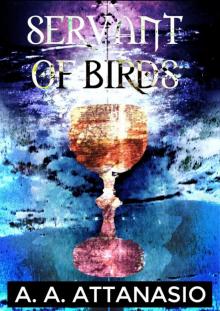 Servant of Birds
Servant of Birds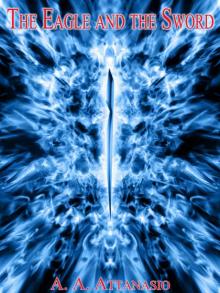 The Eagle and the Sword (The Perilous Order of Camelot Book 2)
The Eagle and the Sword (The Perilous Order of Camelot Book 2)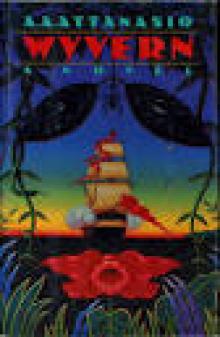 Wyvern
Wyvern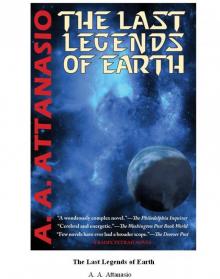 The Last Legends of Earth
The Last Legends of Earth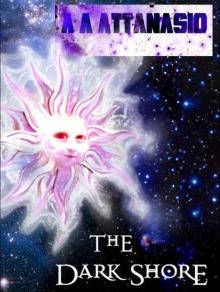 The Dark Shore (The Dominions of Irth Book 1)
The Dark Shore (The Dominions of Irth Book 1)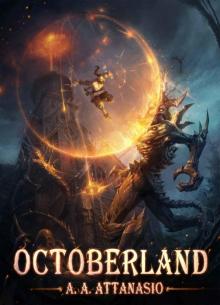 Octoberland (The Dominions of Irth Book 3)
Octoberland (The Dominions of Irth Book 3)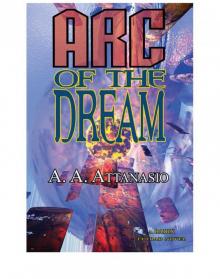 Arc of the Dream
Arc of the Dream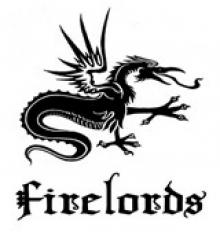 p1b6fn7sdh1ln0g4v1pkvkuqim54
p1b6fn7sdh1ln0g4v1pkvkuqim54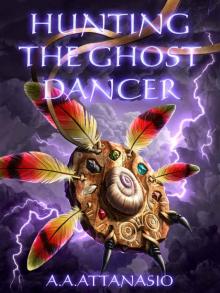 Hunting the Ghost Dancer
Hunting the Ghost Dancer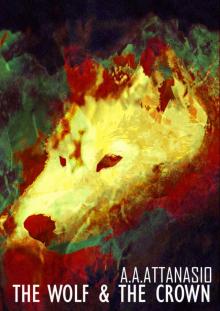 The Wolf and the Crown (The Perilous Order of Camelot Book 3)
The Wolf and the Crown (The Perilous Order of Camelot Book 3)